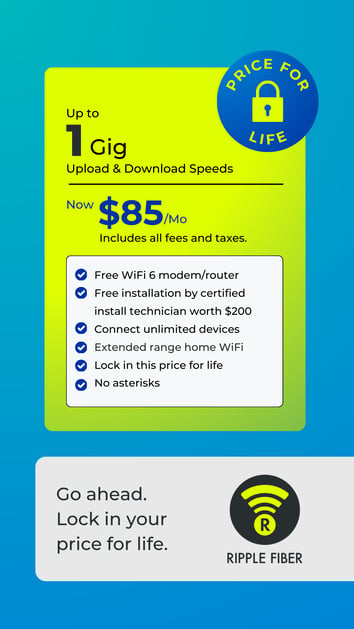Internet performance is no longer just a luxury. It’s essential. Whether you're streaming, working remotely, gaming, or learning online, speed and reliability are non-negotiable. While cable internet has served many households for years, fiber internet is quickly emerging as the new gold standard. Let’s unpack the key differences between the two and shed some light on why making the switch is a smart move.
What is cable internet?
Cable internet delivers data through coaxial copper cables—technology originally designed for TV signals. While it still provides decent speeds for many users, the system has limitations. Because bandwidth is shared among neighbors, speeds may decrease during high-traffic periods. Older infrastructure is also more vulnerable to outages and signal degradation.
- Pros: Since cable is widely available in many communities across the country, getting set up is usually quick.
- Cons: Slower speeds, higher latency, and performance drops during busy times are more likely.
What is fiber internet?
Fiber internet transmits data using pulses of light through strands of glass. This design makes it incredibly fast, efficient, and more resilient than cable. Unlike copper, fiber doesn't lose performance quality over long distances and is less vulnerable to weather interference. These are a few of the qualities that make fiber internet future-ready.
- Pros: Fiber is ultra-fast and boasts symmetrical upload/download speeds, minimal latency, and future scalability.
- Cons: Availability is still expanding but growing rapidly thanks to providers like Ripple Fiber.
Why fiber wins
When your household is juggling video calls, 4K streaming, smart devices, and remote work, fiber internet delivers the speed, reliability, and capacity you need to keep everyone connected.
- Bandwidth: Supports multi-gig speeds, easily managing multiple devices and data-heavy tasks without lag
- Symmetrical speeds: Delivers equal upload and download speeds, which is ideal for video conferencing, cloud backups, and livestreaming
- Latency: Offers quicker response times and smoother performance than cable, making it ideal for gaming, live streaming, and other real-time online activities
- Enhanced security: Provides a more secure connection, making it harder for hackers to intercept—an important advantage as cyber threats continue to rise
- Reliability: Delivers consistent performance with fewer outages, thanks to underground, weather-resistant cables
- Energy efficiency: Consumes less energy and generates less heat, making it a greener choice
- Home value: Increases property appeal and resale value, with homes selling for up to 5% more thanks to future-ready connectivity
What now?
While fiber internet is still working its way through each state to provide residents with enhanced digital access, major efforts to expand service availability are making progress every day. While initial costs can be slightly higher, the long-term value in performance and reliability is unmatched.
Learn more about why fiber internet is the future by visiting our blog page. If you're ready to make the switch, check availability to see if we’re in your neighborhood, then choose the package and pricing that best fits your household.


